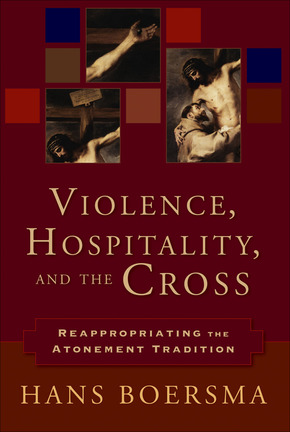Hans Boersma: Violence, Hospitality, and the Cross
 Hans Boersma, Violence, Hospitality, and the Cross: Reappropriating the Atonement Tradition (Grand Rapids: Baker Academic, 2004), 288 pages.
Hans Boersma, Violence, Hospitality, and the Cross: Reappropriating the Atonement Tradition (Grand Rapids: Baker Academic, 2004), 288 pages.
Hans Boersma takes a serious look at the traditional theories of atonement and investigates the role of violence in Christ’s saving work. To speak of violence in the context of God’s work of salvation is both obvious and bold. It is obvious that the violent execution of Jesus stands at the heart of the atonement. At the same time, it is bold to speak of this violence as an attribute of God’s nature. The cross stands at the heart of this tension between God’s hospitality and the violent nature of salvation history. Violence, Hospitality, and the Cross unfolds on the basis of the paradox that all acts of hospitality in creation require some degree of violence. Boersma challenges the reader to carry this language also into an understanding of God.
Originally trained in the Netherlands, the Reformed theologian Hans Boersma now serves as the J. I. Packer Chair of Theology at Regent College. He takes seriously the challenges of Reformed theology in general, and Calvin’s view on election and predestination, in particular. Nonetheless, Calvin is not the starting point for this book but rather a sounding board that allows Boersma to develop more fully his own theology of the atonement in the terms of hospitality.
The book consists of three parts addressing questions of violence in the context of divine hospitality. Part one sets the tone by introducing the possibility of speaking about God’s hospitality in the face of violence. Part two focuses on the place of the cross in the atonement tradition. Part three draws conclusions from the previous discussion for Christian life and the Church as a community of hospitality. A short epilogue suggests the possibility for the end of all violence in the arrival of God’s unconditional, eschatological hospitality.
The book engages an impressive range of theological, biblical and philosophical sources. The starting point for the discussion is formed by questions of divine hospitality. The late modern debate has framed these questions largely in the context of the necessity and possibility of an unconditional and unlimited hospitality. Boersma suggests that all hospitality is embedded in a context of violence and therefore shaped by the conditions of human existence. Nonetheless, he does not view the boundaries and limitations of creation as negative but suggests, instead, that a positive perspective on violence could redefine our understanding of the atonement and, in turn, of the divine hospitality. Central to this attempt is Boersma’s definition of violence as harm or injury.
Boersma argues that God’s hospitality requires a passionate anger toward anything that violates this relationship of love. The Calvinist emphasis on election tends to emphasize the limited character of God’s hospitality and draws the violence against the non-elect into the heart of God, thereby blurring the possibility of an unconditional and unlimited divine hospitality. In contrast, Boersma speaks of God’s “preferential hospitality” that serves a missiological purpose by embracing potentially all nations. On this basis, the book unfolds the implications of the various atonement theories for an understanding of God’s hospitality.


